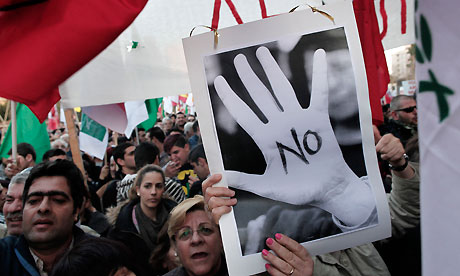Larry Elliott, economics editor The Guardian Tuesday 19 March 2013 19.20 GMT
Either Europe or the IMF give Cyprus more money – or Germany and the other hardliners insist the deal is non-negotiable, in which case the banks will go bust

The notion Cyprus’s parliament would reject the bailout proposal was not factored in to what was likened to one of Baldrick’s ‘cunning plans’ in Blackadder. Photograph: AP
It must have seemed so simple for the politicians and officials who pieced together the bailout plan for Cyprus announced last weekend.
One of the smaller eurozone countries, Cyprus had become the money-laundering centre of choice for Russian oligarchs and there was no way Angela Merkel was going to agree to a blueprint that would see German taxpayers subsidising Moscow billionaires, especially with an election looming this autumn.
So bank depositors in Cyprus would be obliged to pony up one euro for every two provided by the European Union and the International Monetary Fund, with the levy imposed across the board. Cyprus was a special case, it was insisted, and therefore there would be no knockon effects to the rest of the eurozone.
The notion that the Cypriot parliament would reject the proposal was not factored into the calculations, a fatal flaw in what one City analyst compared to one of the "cunning plans" conjured up by Baldrick in the Blackadder series.
Other commentators were less inclined to see the funny side of what was clearly an escalating crisis. One said it was the opening of Pandora's Box; another saw events in the eastern Mediterranean country as the equivalent of the assassination of archduke Franz Ferdinand in Sarajevo.
So what happens next? Forget some of the more far-fetched scenarios. Cypriot MPs voted down the idea of a tax on bank deposits as a condition of a bailout on Tuesday night and they are unlikely to have a crash re-think given the public fury at the raid on their savings. Russian president Vladimir Putin is not going to come to the rescue with some cash from the Kremlin – though there are rumours that state-controlled energy company Gazprom might rescue the most troubled bank in return for seizing control of the island's potentially lucrative gas reserves. But this is not one of the times when Europe can kick the can down the road, hoping all will be well in time.
Instead, there are really only two plausible scenarios: somebody – be it Europe or the IMF – gives Cyprus more money, in which case there is a chance that the crisis can be contained. Or Germany and the other hardline eurozone countries can insist that the deal is non-negotiable. In which case, the banks in Cyprus will go bust, risking widespread turmoil.
Given the precarious eurozone economy and the enfeebled state of European banks, cutting Cyprus a better deal looks like the safer option. The package could be restructured so that only deposits in excess of €100,000 (£85,000) are taxed, the preferred option of Christine Lagarde at the IMF. Sparing those with savings of less than €100,000 from any pain would require the bigger depositors to pay a 15.5% tax to find the €5.8bn demanded of Cyprus. Alternatively, Europe could easily find the extra €5.8bn itself.
The problem is that both options will cause political problems. Putin will bridle at suggestions that Russian citizens – who make up a large proportion of the €100,000 depositors – should be singled out. And Merkel could expect an almighty domestic backlash if she backtracked from the tough stance she adopted at the weekend.
But the alternative is to let the banks in Cyprus go bust as soon as they are reopened after the extended bank holiday and hope that it really is a "special case". That looks like an awfully big gamble.
![The [Greek] European Tragedy](https://blogger.googleusercontent.com/img/b/R29vZ2xl/AVvXsEiWKI5s90SFm1wWTk6bs4p7CgslaC2SnYPsrZhb-B-smOufNNCSxCvpBLI9hOB-LsXZjir_PNmEiMk2-E62F3xkg96IoC6QFAaZAnPRTVH340IN9WBRmWJqPkjWlgyRj3zpALp7h6hvA58/s920/GkBack_new.jpg)
